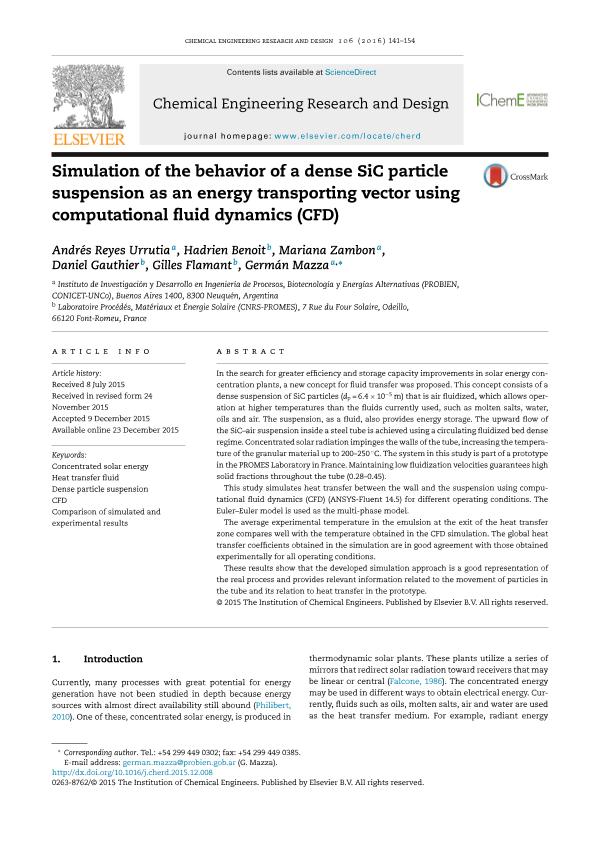Artículo
Simulation of the behavior of a dense SiC particle suspension as an energy transporting vector using computational fluid dynamics (CFD)
Reyes Urrutia, Ramón Andrés ; Benoit, Hadrien; Zambon, Mariana Teresa; Gauthier, Daniel; Flamant, Gilles; Mazza, German Delfor
; Benoit, Hadrien; Zambon, Mariana Teresa; Gauthier, Daniel; Flamant, Gilles; Mazza, German Delfor
 ; Benoit, Hadrien; Zambon, Mariana Teresa; Gauthier, Daniel; Flamant, Gilles; Mazza, German Delfor
; Benoit, Hadrien; Zambon, Mariana Teresa; Gauthier, Daniel; Flamant, Gilles; Mazza, German Delfor
Fecha de publicación:
02/2016
Editorial:
Institution of Chemical Engineers
Revista:
Chemical Engineering Research & Design
ISSN:
0263-8762
Idioma:
Inglés
Tipo de recurso:
Artículo publicado
Clasificación temática:
Resumen
In the search for greater efficiency and storage capacity improvements in solar energy concentration plants, a new concept for fluid transfer was proposed. This concept consists of a dense suspension of SiC particles (dp = 6.4 × 10-5 m) that is air fluidized, which allows operation at higher temperatures than the fluids currently used, such as molten salts, water, oils and air. The suspension, as a fluid, also provides energy storage. The upward flow of the SiC-air suspension inside a steel tube is achieved using a circulating fluidized bed dense regime. Concentrated solar radiation impinges the walls of the tube, increasing the temperature of the granular material up to 200-250 °C. The system in this study is part of a prototype in the PROMES Laboratory in France. Maintaining low fluidization velocities guarantees high solid fractions throughout the tube (0.28-0.45).This study simulates heat transfer between the wall and the suspension using computational fluid dynamics (CFD) (ANSYS-Fluent 14.5) for different operating conditions. The Euler-Euler model is used as the multi-phase model.The average experimental temperature in the emulsion at the exit of the heat transfer zone compares well with the temperature obtained in the CFD simulation. The global heat transfer coefficients obtained in the simulation are in good agreement with those obtained experimentally for all operating conditions.These results show that the developed simulation approach is a good representation of the real process and provides relevant information related to the movement of particles in the tube and its relation to heat transfer in the prototype.
Archivos asociados
Licencia
Identificadores
Colecciones
Articulos(PROBIEN)
Articulos de INST. DE INVESTIGACION Y DES. EN ING. DE PROCESOS, BIOTECNOLOGIA Y ENERGIAS ALTERNATIVAS
Articulos de INST. DE INVESTIGACION Y DES. EN ING. DE PROCESOS, BIOTECNOLOGIA Y ENERGIAS ALTERNATIVAS
Citación
Reyes Urrutia, Ramón Andrés; Benoit, Hadrien; Zambon, Mariana Teresa; Gauthier, Daniel; Flamant, Gilles; et al.; Simulation of the behavior of a dense SiC particle suspension as an energy transporting vector using computational fluid dynamics (CFD); Institution of Chemical Engineers; Chemical Engineering Research & Design; 106; 2-2016; 141-154
Compartir
Altmétricas



